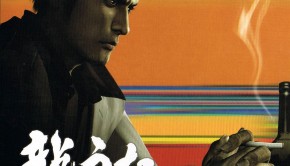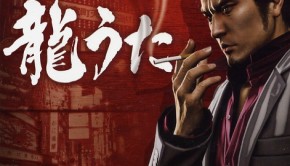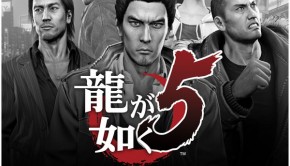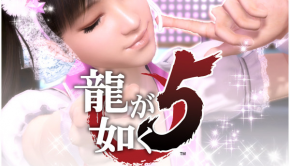Yakuza 4 Original Soundtrack Vol. 2
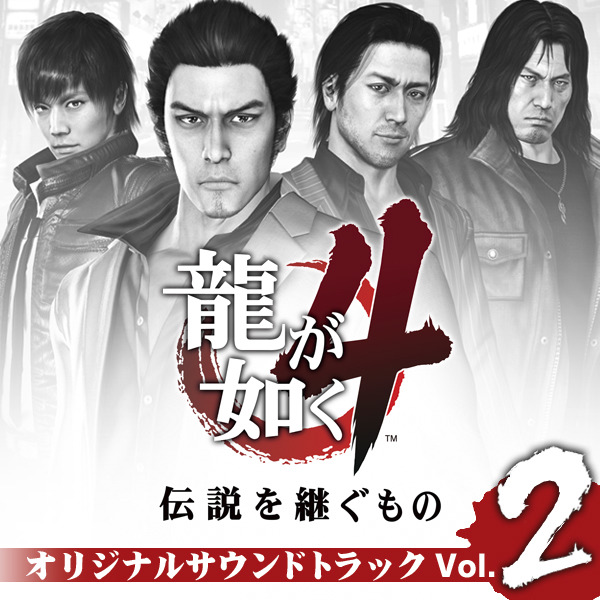 |
Album Title: Yakuza 4 Original Soundtrack Vol. 2 (Ryu ga Gotoku 4 Densetsu wo Tsugumono Original Soundtrack Vol. 2) |
| Record Label: SEGA |
|
| Catalog No.: N/A |
|
| Release Date: March 24, 2010 |
|
| Purchase: Buy at iTunes |
Overview
Yakuza 4 Original Soundtrack Vol. 2 (or Ryu ga Gotoku 4 Densetsu wo Tsugumono Original Soundtrack Vol. 2 in Japan) is the second of two soundtracks released digitally for the game. As per the usual, it features compositions by a large number of Sega artists. This volume includes many of the lighter tracks from the game, including the club and karaoke tracks. Like the first volume, this volume should not be thought of as a single disc, as it actually carries an hour and a half of material.
Body
A prominent inclusion of this volume is that of club themes and other similar area tracks. “New Serena” is the first of these, a silky and smooth R&B track with a wavy atmosphere, relaxing and very pleasing to listen to. The later “Delusion” is fairly similar in feel, not remarkable but perfectly serviceable. Other tracks are more upbeat like “Casino”, brightening the soundscape with acoustic sounding instruments, notably an acoustic guitar that does some nice improvising. “JeweL” is more techno-oriented in sound, with a common vocal sample that doesn’t really do much for the track, but its still enjoyable enough. Better is “SHINE” with its whirring synth and keyboard improvisations. “Eliese” is even more upbeat with a stronger dance beat than the others, but it’s a little repetitive overlong, and the shorter “Be All Ears” makes more impact with a busier, more concentrated sound. None of tracks are really particularly memorable on your own, but they work well enough in their context.
With a similar feel are the lighter massage tracks. “Standard Massage” is my favourite of the four, with a calming atmosphere. Its pizzicato strings work well with the pads and synth choir to make a pleasant underlying support for its nice, simple melody on piano. “High-Grade Massage” and “VIP Massage” on the other hand have similar elements but are a bit brighter, but they also cross into cheesy territory. This feeling is offset interestingly by their woodwinds on main melody, which add an air of maturity that helps the tracks, though perhaps not quite enough. “Hyper Massage” is quite different in that it brings the club-feel back. It’s not as unique as the other massage tracks, but again it is perfectly serviceable in the game.
A number of rock tracks also make it over into this volume, generally a bit more lighthearted and less serious than those from the first volume. “Fighting Fighter” is decent with high energy, but with nothing special going for it, especially compared to the stronger tracks from the first volume. The short “My Hero” brings in some synths and piano, but it all sounds rather dated and over-the-top in its goofiness. “Fish On! ver.2” is similar to the original but with a fuller sound, as well as a variation on the original melody. It’s decent enough, but it does get repetitive. “Big Fish On!!” fares better since it strays away even more from that repeated melody, and it also has more energy. “BOXCELIOS II” adds brass to the mix, though it is initially even more repetitive than the previous tracks, quickly becoming grating. But if one can make it through the first minute, the track becomes quite good.
The remaining tracks are all vocal tracks, most pop with several versions for the different vocalists. “So Hot Ping-Pong” is a dance track in line with what we’ve already heard, but its fun enough and it should be noted that it’s one of the rare tracks with properly pronounced English vocals. Following those lounge-y dance stylings are the J-Pop “Saturday Night Lover” and “The Whereabouts of a Finger”. The vocalist might be too cutesy for some, but the tracks are otherwise nice and fun, and decently catchy. “Summer memories” and “Otomeiro my life” use a rock base instead, and are similarly fun and perhaps a tad too cute. “Shooting Star” is a quiet ballad which is actually very nice, with a mid-tempo pace and a mix of acoustic instruments and strings. Then there are the karaoke tracks with their different versions, having identical arrangements but with different vocalists. “rain drops” is standard J-Pop fare, and unfortunately all of the vocalists sound too processed, but Noa Mizutani’s version stands out for having a more mature-sounding vocal. “Get To The Top!” is more energetic, and other than Haruka’s version with the younger vocal, the other three sound much more mature. Then there is “Kamurochou Love Song”, with a clear ‘70s J-Pop sound. Incredibly cheesy, but all the more endearing for it, especially since Kiryu’s voice actor does his own singing. His pairing with Maya is the better offering, and they sound quite good together. Kiryu also sings “MachineGun Kiss”, an incredibly fun rock track with a great chorus, though I wish that it was pitched higher to give his voice more intensity. Anyone not already a fan of J-Pop probably won’t be impressed much with these tracks, but for others who don’t expect anything deep or groundbreaking, these tracks are fun enough. Though it is a shame that these tracks are not longer than their in-game versions.
Summary
Yakuza 4 Original Soundtrack Vol. 2 covers the more colourful aspects of the game, but it will cater to fairly specific tastes and won’t be for everyone. Each track works well enough in the game, but most of them do not rise above the level of atmospheric background music, and thus are not too compelling to listen to outside of the game. There are a few that stand out more like the “Massage” tracks and some of the karaoke songs, but these can simply be picked out for individual purchase, and as a whole it probably won’t satisfy anyone but ardent fans.
Do you agree with the review and score? Let us know in the comments below!
3
Posted on May 25, 2016 by Christopher Huynh. Last modified on May 25, 2016.

